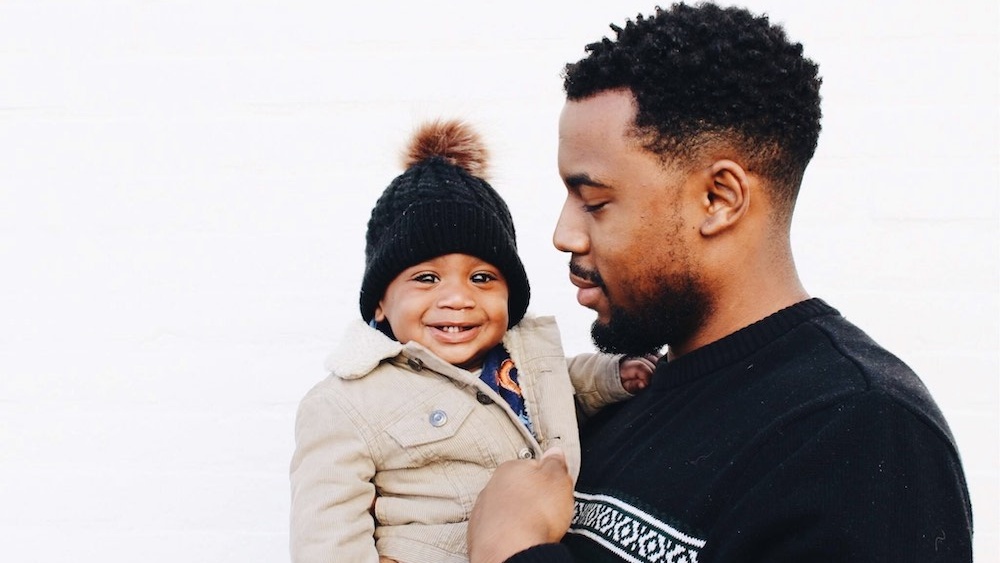If you’re interested in sharing your opinion on any cultural, political or personal topic, create an account here and check out our how-to post to learn more.
____
Today I picked up Levi from daycare like I always do. He’s grown accustomed to saying “knock knock” as we make our way up the stairs and approach our front door. Soon after I catch my breath, he begins his ritualistic “Dada” chant. I’m sure our entire apartment building can hear his “Dada” crescendo from a whisper to an echoing scream as his voice makes its way down the hallway, bouncing off the walls only to make its way back to us. He can’t wait to lay his eyes on his Dada.
Usually I fumble with the keys while unlocking the door. As it creaks open, he catches a glimpse of his father, Kyle. When he does, he squirms out of my hands and Usain-bolt’s to hug whichever of Dada’s limbs is easiest to reach.
Today, we got home before Kyle did, and though I calmly reminded him Dada would be home later as we walked up the stairs, his chant was already in full swing. I’m sure all he could hear was the sweet sound of his affection for his Dada swirling around in his little ears. I fumbled around with the keys (per usual), opened the door and slowly lowered him to the ground as I could feel a wave of disappointment make it’s way from his wandering eyes through the rest of his body.
He practically jumped out of my arms and began to make his way around the kitchen, screaming, “DADA! DADA!” He ran from the kitchen to the bathroom, to the closet and back to the front door. I could see the panic on his face as he melted into utter sadness when he realized Dada wasn’t there.
When I saw his face, I felt myself start to tear up. Not because I was sad for him (though I truly was), but because I’d seen that look before. As a trauma therapist, I’d seen that face on several clients as they sat across from me retelling the moments their hearts ached for the presence of their mother or father. Moments where excitement from accomplishments slowly transformed to grief because all they felt was absence. Moments they wished they could share, but no longer could.
Watching Levi run around the house frantically calling out for his Dada only to end up slumped on the ground in disappointment made my heart sting for those who are going into this holiday season feeling the emotional equivalent of what I witnessed in my own child. In such a short time on this earth, he made such a significant attachment to his father — a reminder that pain from parental loss doesn’t just disappear. In loss, it’s just as intense and intricate as the attachment and affection developed from years of love.
The pain of losing a parent doesn't disappear, it finds a new home in each season of life. Sometimes in habits, sometimes in relationships and even the hearts of the ones we create lives with. The cry for a parent is one that I’m convinced can never be silenced, only transformed or redirected. Though Levi didn’t have the language to express his despair, he still felt Kyle's absence fully. I can only imagine the neurological encoding that occurs when a person feels that kind of deep and abiding loss regularly. What a reminder that love, safety, attachment and trust are pre-verbal and don’t need words to be recalled or remembered in the body.
Levi’s small breakdown illuminated all the ignorant ways I’d run from facing the pain of loss because it was scary, and it wasn’t mine. It’s amazing what we’ll do to escape what scares us, not knowing it often forces us to escape the very people we want to love. The world is filled with little boys and girls with broken hearts calling for their parents, uttering an intimate “Dada,” only to be met with silence. If we listen closely, we’ll find those voices sound like our mothers, fathers, friends and coworkers. If we dare to listen even closer, we’ll hear the voices of those betrayed by parents and abandoned by guardians, a death in it’s own right.
I’ve decided that this holiday season will be committed to checking in and being with those without parents, to those dealing with hard parental situations. Creating space for the pain and uncertainty of those we love is not just the job of a clinician, it’s a task we’re all called to take on and embrace. May this holiday season be one where you turn your heart toward the people around you.
A happy holiday is a vulnerable one.

